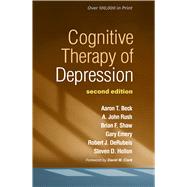Reflecting major contemporary developments in theory and clinical practice, the second edition of this authoritative guide has been significantly rewritten with 85% new material. Cognitive therapy (CT) pioneer Aaron T. Beck and associates provide cutting-edge knowledge about the cognitive model of depression and the most effective, lasting ways to reduce clients' suffering. The volume links clearly explained theoretical principles to specific therapeutic strategies. Techniques for identifying, examining, and changing the thoughts, beliefs, and behaviors that give rise to depression and related disorders are illustrated with compelling vignettes and sample dialogues.
New to This Edition
*Reflects the maturation of CT for treating more complicated presentations, including patients with chronic depression or underlying personality disorders.
*Brings therapists up to date on schema-focused approaches as well as classic cognitive and behavioral interventions.
*Incorporates data from basic research and many dozens of clinical trials.
*All-new vignettes and a chapter-length case example.
*Greater attention to the therapeutic relationship and to longer-term treatment.








